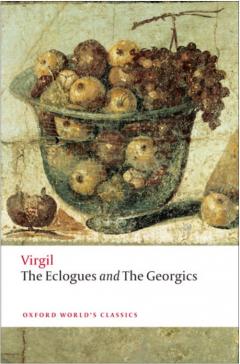The Eclogues, ten short pastoral poems, were composed between approximately 42 and 39 BC, during the time of the 'Second' Triumvirate of Lepidus, Anthony, and Octavian. In them Virgil subtly blended an idealized Arcadia with contemporary history. To his Greek model - the Idylls of Theocritus - he added a strong element of Italian realism: places and people, real or disguised, and contemporary events are introduced. The Eclogues display all Virgil's art and charm and are among his most delightful achievements.
Between approximately 39 and 29 BC, years of civil strife between Antony, and Octavian, Virgil was engaged upon the Georgics. Part agricultural manual, full of observations of animals and nature, they deal with the farmer's life and give it powerful allegorical meaning. These four books contain some of Virgil's finest descriptive writing and are generally held to be his greatest and most entertaining work, and C. Day Lewis's lyrical translations are classics in their own right.

